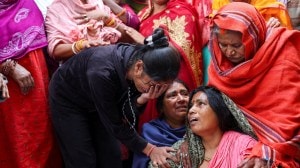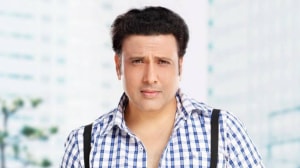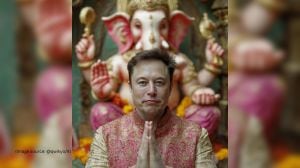The Baby I Cant Have
As more men and women delay marriage and parenthood,and as age catches up,urban infertility is becoming a common story. Couples across the country are coping with social pressure and invasive treatments,and stubbornly clinging to hope.
As more men and women delay marriage and parenthood,and as age catches up,urban infertility is becoming a common story. Couples across the country are coping with social pressure and invasive treatments,and stubbornly clinging to hope
The cry of little Minal sets Manju Jain aflutter. Shes finally awake, says the 38-year-old,rushing to the childs bedroom to change her diaper. Manju and her husband,Anand,run a chemicals business and live in a large four-bedroom apartment on Hosur Road in Bangalore. The same time last year,they had almost abandoned this flat,and with it,their hopes of having a child. We had begun to wonder why we should live in such a big house when there was no one to share it with, says Manju,who moved to the city from Mumbai after her marriage in 1998. The need for a child didnt dawn on the couple till four years ago. And then,it was almost too late. It was in the summer of 2007 that I felt ready to be a mother. We were holidaying in France and there were a lot of young couples pushing their tiny pink babies in strollers. We realised we wanted a baby of our own, says Manju,beaming at four-month-old Minal in the soft-toy heaven thats her bedroom.
In the front balcony shielded by soundproof glass Minal doesnt like traffic Manju talks about why it is difficult not to pamper her bundle of joy. I dont know what Id have done if the third IVF cycle had failed, she says,referring to the three rounds of in-vitro fertilisation the couple had to undergo before Manju could become pregnant. Its ironic that I took so much care not to get pregnant,only to realise when I wanted a baby that the quality of my eggs was too poor for them to be fertilised naturally, she says.
Its a common story,says Kamini Rao,an infertility expert in Bangalore. A woman is most fertile in her 20s,but whether to have a child at that age or later,when she is more ready for it,is a difficult choice, she says,between patients at the Bangalore Assisted Conception Centre (BACC),one of the most reputed infertility clinics in the city. The clinic offers oocyte-freezing facilities,so women can use eggs retrieved at a young age to get pregnant later.
Rao and other gynaecologists say there has been a clear rise in infertility in India in the last decade or so,especially among urban couples. They attribute this to a combination of environmental factors pollution,stress,tight clothes and obesity and to increasing instances of couples putting off having children until they are well into their 30s. One of the pioneers of IVF in India,Mumbai-based Dr Nandita Palshetkar,says changing lifestyles are partly to blame. The biological clock of a woman has a large role to play in her capability to conceive. Sixty per cent of women have complications in their pregnancy after 40 whereas the risk is 10 per cent among women within the age of 35, she says.
Obesity alone is responsible for several complications,including polycystic ovary syndrome and decreased sperm function,says Dr Rao. Lack of knowledge about fertility decline with age is another reason,says Dr Sohani Verma,in charge of the IVF centre at Apollo Hospital in Delhi. According to the third National Family Health Survey conducted in 2005-06,70 per cent of total urban fertility (and 63 per cent of total rural fertility) is concentrated in the prime childbearing ages 20-29. Beyond 30,says Dr Verma,female fertility starts declining sharply and cannot be reversed.
Age,however,is only one piece in the infertility puzzle. In over 40 per cent of cases,it is the man who needs treatment,say doctors. But that remains unacknowledged. In a bustling IVF OPD in West Delhi’s Rajendra Nagar,a lucky couple who conceived in the first attempt and are five months into the pregnancy are all praise for IVF. The 38-year-old husband says,We were trying to conceive for nine years. My wife had a problem,so we failed despite assisted conception treatment at other centres. Finally,we had to go in for IVF. The couple’s medical records reveal a twist in this tale. This was a referral case from an IVF centre in Gurgaon. Their reports said the husband had zero sperm count. We centrifuged his semen and managed to find one sperm,which we used for IVF, says Dr Abha Majumdar,director of the IVF centre at Sir Gangaram Hospital. Male infertility has been on the rise,Dr Majumdar says. From 20 per cent three decades ago,it is now responsible for almost 40 per cent of all urban infertility, she says.
There are three stages of infertility treatment. The first,a minimal one,is timed intercourse. Manju Jain recalls this phase with fondness. They would give me some medication to time my cycles and ask us to have sex for three days in a row. It was quite funny at first, she says. The fun didnt last long. Sex at the time of ovulation gives a healthy woman a 30 per cent chance of pregnancy; for Manju,who had a poor ovarian reserve,this simply did not work. Next came three cycles of intrauterine insemination (IUI) a simple procedure where mechanical barriers are superseded and quality sperm is injected directly into the uterus. When this,too,failed,doctors brandished the trump card many couples have come to depend on: in-vitro fertilisation,in which eggs retrieved from the womb are fertilised outside and the embryo implanted on the third or the fifth day. Even after this,things could go wrong,as they did in Manjus case: the endometrial (uterine) cells,for instance,may not crosstalk properly with the embryo.
One should understand that at every step,we are going against nature. We try to simulate the conditions inside the womb,and yet,the embryo cannot survive outside for more than a few days. We pump hormones that a natural pregnancy would produce in a mothers body. We stimulate the ovaries with injections. If the womb doesnt accept the embryo,we dont always know why that is so, says Dr Mekhala Dwarakanath,a fellow in reproductive medicine at BACC.
IVF is expensive,costing between Rs 50,000 and Rs 1.5 lakh per cycle,and can be extremely painful for women. But with success rates up to 40-50 per cent in recent years,it is more popular than it was a decade ago. With increasing purchasing power,couples no longer hesitate to opt for IVF. When I came to Bangalore in 1990 from the UK and set up this clinic,there were only a handful of IVF centres in all of India. Now,there must be over 1,000, says Dr Rao. In Delhi alone,the nine clinics registered under the National Assisted Reproductive Therapy Registry of India in 2005-06 have grown to 36 in 2011. Kerala has 10 super speciality infertility hospitals,which carry out IVF and other treatments. The UK-based Bourn Hall Clinic the world’s first IVF clinic opened its first Indian centre in Kochi in February.
This dependence on IVF has led to failure being taken hard. A couple of weeks ago,the Delhi State Consumer Commission slapped a penalty of Rs 15 lakh on a specialist at Gangaram Hospital,terming a failed IVF attempt performed in 1999 a case of medical negligence. Justice Barkat Ali Zaidi,president of the Commission,observed in his judgement,Motherhood is one of the strongest female urges,and deprivation thereof comes as a great setback and disappointment,bringing about frustration of life. The patient,Ipsita Seal,underwent an IVF procedure at the hospital in 1999,after two of her pregnancies had to be terminated due to complications. Seals husband,Pratap Aditya Seal,argued his wifes case himself,without any counsel from 2001. They argued that the doctor went ahead with embryo transfer the final stage of IVF despite telling Ipsita that she had developed an infection. The doctors counsel argued that there was no infection and it was a routine IVF failure. Seal,an administrative officer at the Archaeological Survey of India,says the failure of IVF left his wife scarred for life. They could not afford another IVF,and adoption was never an option. We have remained childless. Somebody has to be held accountable, he insists.
If being childless is stressful,IVF brings with it fresh trauma. Ask 28-year-old Ankita Majumdar,who has pinned all her hopes on her third and final IVF attempt this year. Married in 2004,Ankita,a Mumbai resident,has been undergoing infertility treatment for the last two years. An adopted child herself,she was advised by her mother to adopt but is insistent on having a child of her own. We began with three cycles of intrauterine insemination (IUI),with no success. Another two sessions of IVF treatment have also failed, says Ankita. The treatment has taken its toll on Ankita,who now has a definite paunch,strands of white hair and medical problems. But it was the emotional turmoil that was hardest to handle. It was painfully physically but also mentally. The second time,it raised several questions in my mind about the need for this treatment. It was painful to deal with questions and the constant lies that had to be told to friends and colleagues about leave and health issues, Ankita says.
Despite improved awareness,IVF is a hush-hush affair in many families. Astha,a former ad hoc professor of history at Delhi University,winces when her mother-in-law calls her three-year-old son destiny’s child He is all mine, she says,destiny did not go through all that I did. Barely a year into her marriage,Astha suffered her first miscarriage,and then another. Soon,at Asthas home,books on the Lodhi dynasty,once her area of research,were replaced by journals on reproductive medicine. Though my husband always supported me,he had one condition. I could not talk about our failure to anybody, Astha recalls. Today,not even her husbands brothers family,who live on the ground floor of the family bungalow in Delhi,know that theirs is an IVF baby.
Even the best infertility treatments,however,havent been able to help some couples. Forty-three-year-old Reeta Gandhi is a professional from Pune who works towards the development of children in private schools. Suffering from extensive endometriosis and polycystic ovary syndrome,Reeta has undergone four-five laparoscopic surgeries and come out of them knowing she may never give birth to a child. I am a positive thinker and I have learned to tolerate snide comments, she says. My husband refuses to allow me to go through any more treatment as he has seen the pain I have to bear. Yet I have not lost hope and may just go in for IVF, she says.
Despite the physical trauma of treatments like IVF,adoption is not a choice many are willing to consider. For couples who do opt for it like Pune-based Rahul Dhokte,37,and his wife Rajshree it has been rewarding. The Dhoktes also underwent IVF but when the first cycle failed,doctors dissuaded them from trying again. By then,the couple had already applied for adoption and now have a three-year-old son. It has been difficult as we had hopes of raising our own child, says Rahul,who is an employee at a private firm while Rajshree runs a beauty parlour at home. One cant fight nature. So we decided on adopting a child and our family is more complete today, he says.
At the other end of the spectrum are couples who are childless out of choice. Wildlife lovers and conservationists,Nandini Joshi,30,and her husband decided that they would not want the responsibility of a child to come in the way of their passion for wildlife. We rescue animals in distress. In the future,we are planning to live near a jungle. If we had a child,there would not be any facilities to provide for him or her. The child would be an added responsibility, says Nandini.
Other couples have to fight a daily battle against social pressure to have a child. Despite the fact that I am young and mentally not ready to have children,my mother-in-law keeps cribbing about how she misses a child in the house. My husband is indifferent. I,however,want to focus on my career right now, says Mumbai-based 25-year-old HR professional Nayan Shinghvi.
Shashank and Priyanka Mehra,both media professionals in their late 20s in Mumbai,feel they need to build a strong financial base before having a child.
Once a child comes,everything automatically takes a backseat. We need to be financially well-equipped to pay the expenses that come along with a baby. At this point in our careers,a child is too much of a responsibility to handle, said Priyanka,who has been married to Shashank for over five years.
Weighing the joys of motherhood against a life with fewer responsibilities,Manju Jain says,It is true that my husband and I have given up our hobbies. But when we look at her,our own flesh and blood,the football matches and cookery shows of the world cease to exist. To enjoy life to the fullest,one must create life.
(With inputs from Shaju Philip)
(Some names have been changed on request)



- 01
- 02
- 03
- 04
- 05




























